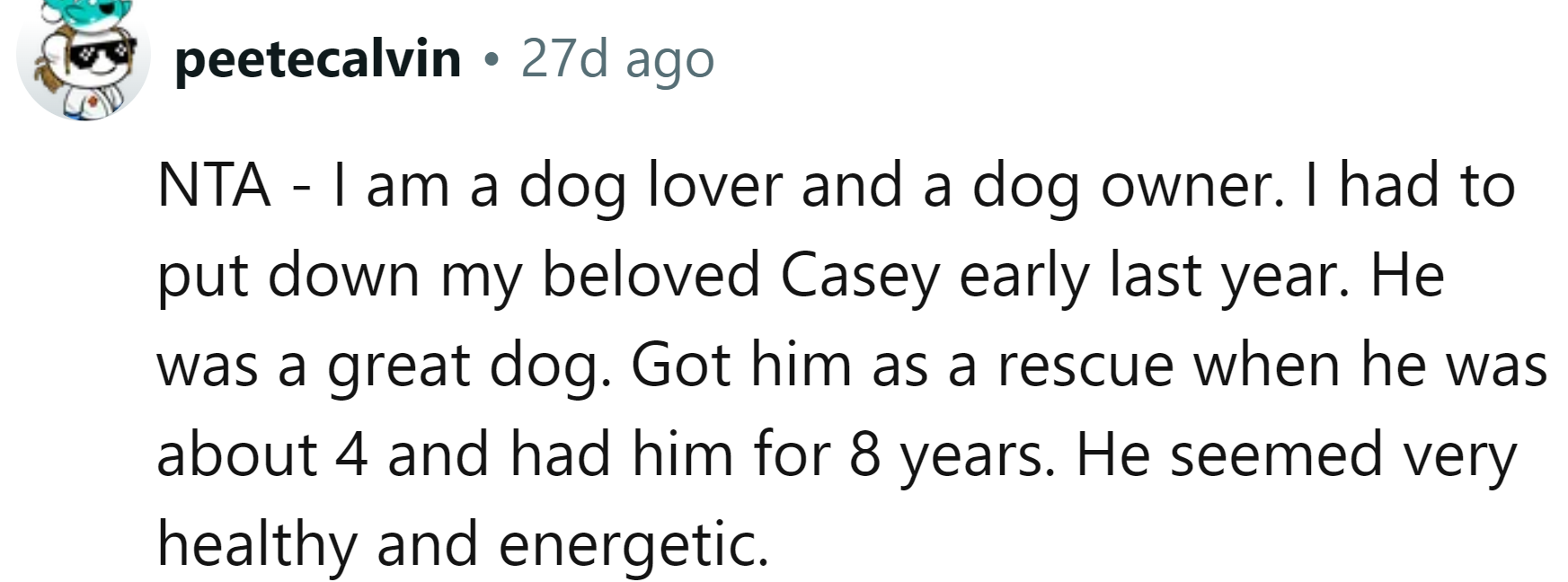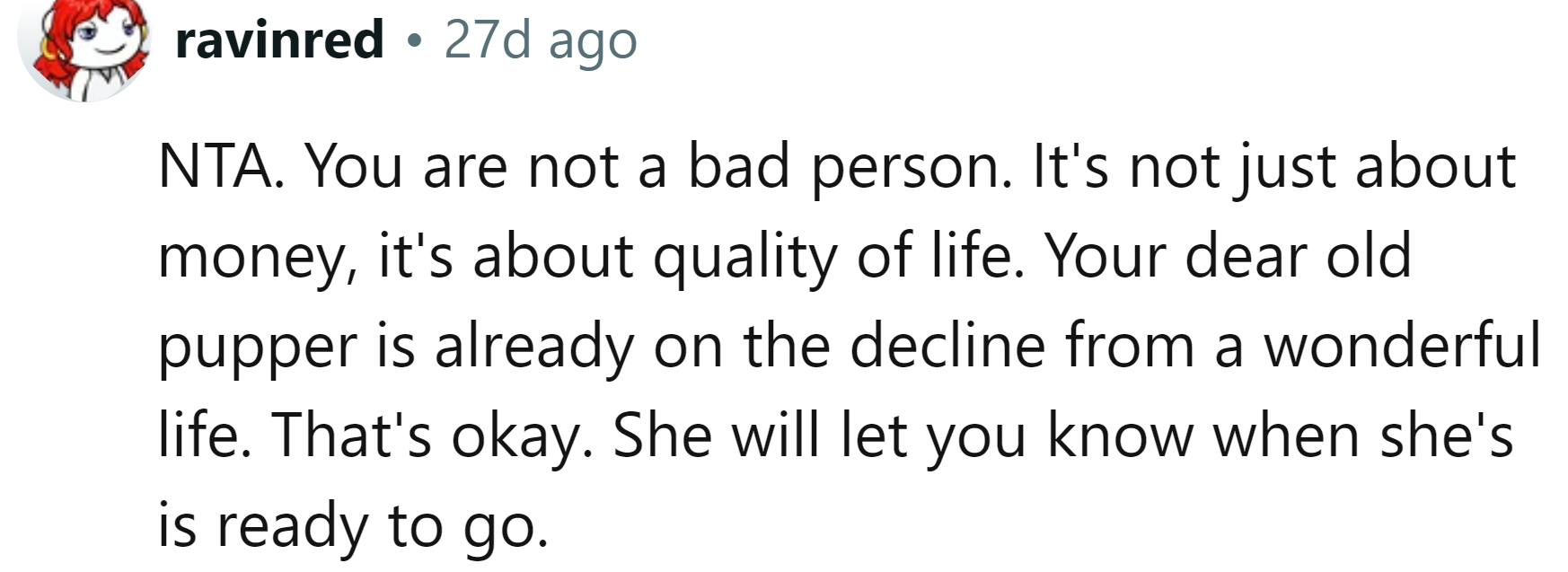Conflicted Redditor Asks If She's An A**hole For Not Wanting To Wipe Out Her Savings To Save Her Dog's Life
We love our pets, and we'd do anything to ensure they are healthy and happy. But sometimes, the care they need might be beyond our means, which can put us in a difficult position.
Reddit user Bitter_Breakfast7755 found herself in that situation recently, and she shared her story in the r/AITA (Am I The A**hole?) subreddit. The OP explained that she recently found out her 16-year-old dog has cancer.
Currently, the dog isn't in any pain, but the vet anticipates that she will steadily deteriorate. Surgery will cost $3,500, and chemotherapy will be about $4,000 on top of that.
With medication, the total price tag for treatment will be at least $10,000. The OP says she could pay for it, but it would wipe out her savings completely and leave her with a significant amount of debt.
The Redditor loves her dog very much, but she is 16 years old, and her quality of life isn't the best as it is. The OP describes her as "a bit like a Roomba," always licking the floor and getting stuck in corners.
As much as the OP loves her pet, she says she can't justify wiping out her entire savings or taking out a loan only to extend her life for a year or two. However, the Redditor mentions that her mom is very attached to the dog as well, and she has been trying to make her feel guilty for not wanting to spend the money.
The OP says she has already decided not to go ahead with the treatment. She hopes that the cancer doesn't get worse, but if it does, she will ensure that her dog is comfortable when the time comes to say goodbye.
But her mom is being very passive-aggressive towards her. She's been telling the dog, "If she really loved you, she'd save you."
The OP says she feels awful about it, but she believes it's the right decision considering her dog's age. Now she's wondering if she's the a**hole here.
The Redditor asked if she's an a**hole for not saving her dog.

The OP explained that she recently found out her 16-year-old dog has cancer.

Currently, the dog isn't in any pain, but the vet anticipates that she will steadily deteriorate.

The Ethics of Financial Sacrifice for Pets
Dr. Julie Spencer, an ethicist and psychologist, discusses the complex ethical considerations surrounding financial decisions related to pet care. Her research indicates that many pet owners grapple with guilt and moral dilemmas when evaluating the costs of life-saving treatments for their pets. These dilemmas often reflect deeper values regarding love, responsibility, and the perceived worth of animal lives compared to human lives.
According to studies in the Journal of Ethics and Social Philosophy, individuals often experience cognitive dissonance when their financial decisions conflict with their emotional attachments.
With medication, the total price tag for treatment will be at least $10k.

The OP says she could pay for it, but it would wipe out her savings completely and leave her with a lot of debt.

The Redditor loves her dog very much, but she is 16 years old, and her quality of life isn't the best as it is.

From a behavioral perspective, the decision to spend significant resources on a pet's health can trigger feelings of anxiety and guilt. Pet owners may worry about being judged by others for their choices, leading to internal conflict about the 'right' decision. Understanding these emotional responses is crucial for navigating these difficult conversations with loved ones.
The OP describes her as "a bit like a Roomba."

As much as the OP loves her pet, she says she can't justify wiping out her entire savings or taking out a loan only to extend her life for a year or two.

But the Redditor says her mom is very attached to the dog as well, and she has been trying to make her feel guilty for not wanting to spend the money.

Finding Balance in Financial Decisions
Experts recommend that pet owners engage in open discussions about finances and priorities with family members. Creating a budget that considers both pet care and other financial responsibilities can help clarify decision-making processes. Additionally, exploring payment plans or pet insurance options can alleviate financial pressure while still prioritizing the pet's health.
Seeking advice from veterinarians on the necessity and implications of treatments can also provide clarity and support during the decision-making process.
The OP says she has already decided not to go ahead with the treatment.

"If she really loved you, she'd save you."

The OP says she feels awful about it, but feels it's the right decision considering her dog's age.

Understanding the psychological factors at play can also involve examining attachment styles. Individuals with anxious attachment may feel particularly pressured to go above and beyond for their pets, fearing judgment or guilt if they don't. Addressing these underlying attachment issues through therapy can help develop healthier perspectives on pet ownership and financial responsibilities.
Now she's wondering if she's the a**hole here.

Here's how people reacted.

Do what's right for you.

Creating a Supportive Environment
Building a supportive network with friends and family can help pet owners navigate tough decisions regarding their pets' health. Sharing experiences with others who have faced similar dilemmas can provide insight and validation. Additionally, engaging in community discussions about responsible pet care can foster a culture of understanding and support.
"Let her go in peace."

"Just because you can doesn't mean you should."

NTA.

"You are not a bad person."

That sucks.

"Don't beat yourself up."

What are your thoughts on this situation? Do you think the OP should spend the money on treatment for her dog, or is she doing the right thing for her furry friend?
We would love to hear your opinions on this. You can share your thoughts with us in the comment section.
Psychological Analysis
This situation underscores the emotional complexities surrounding financial decisions in pet care. It's essential for pet owners to navigate these feelings thoughtfully and to seek support when making difficult choices regarding their pets' health.
Analysis generated by AI
Analysis & Alternative Approaches
In conclusion, navigating financial sacrifices for pet care involves complex ethical and emotional considerations. Research shows that addressing these dilemmas through open communication and community support can lead to healthier decision-making processes. By fostering a supportive environment, pet owners can work towards balancing their emotional attachments with financial realities.



